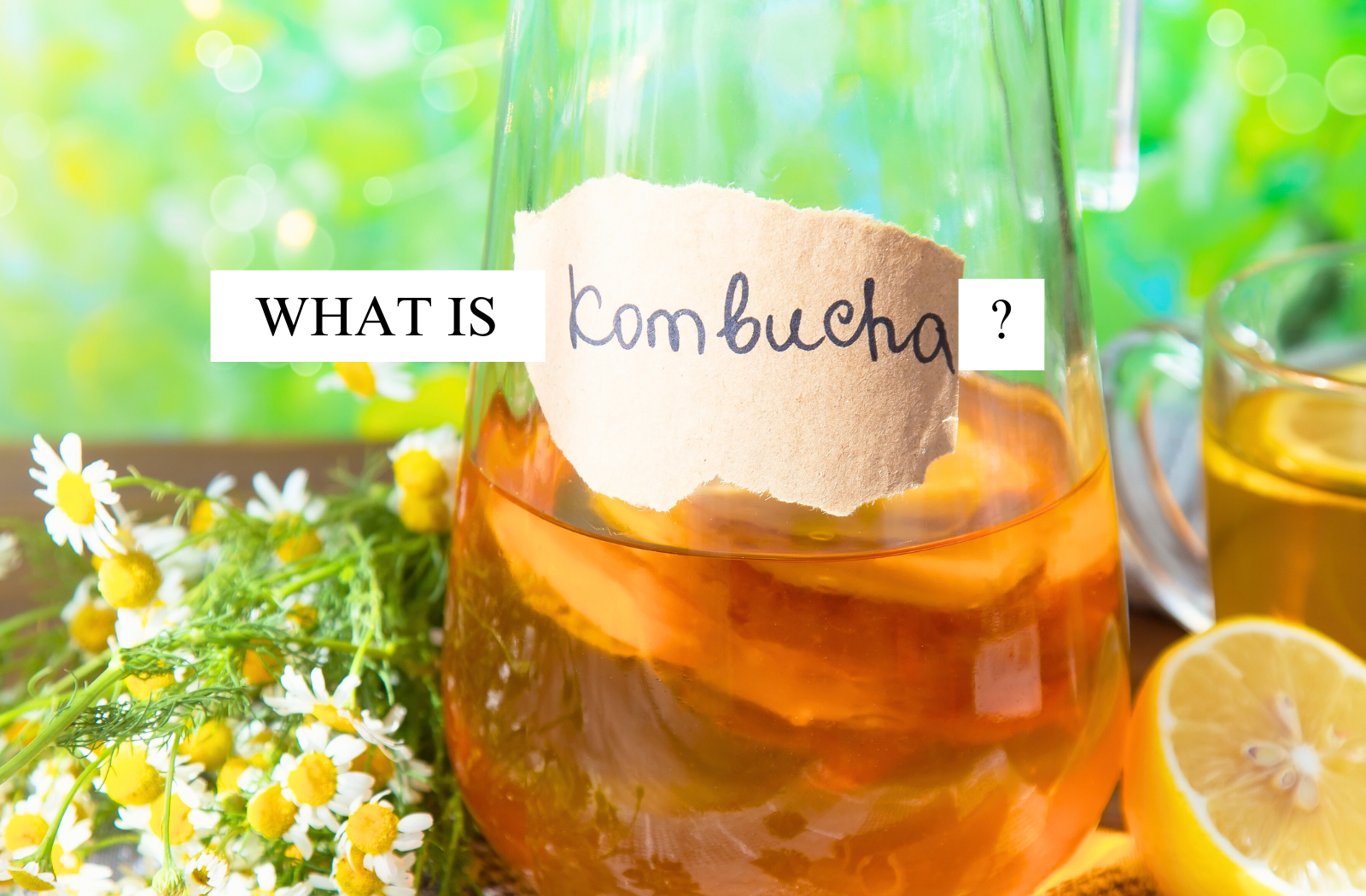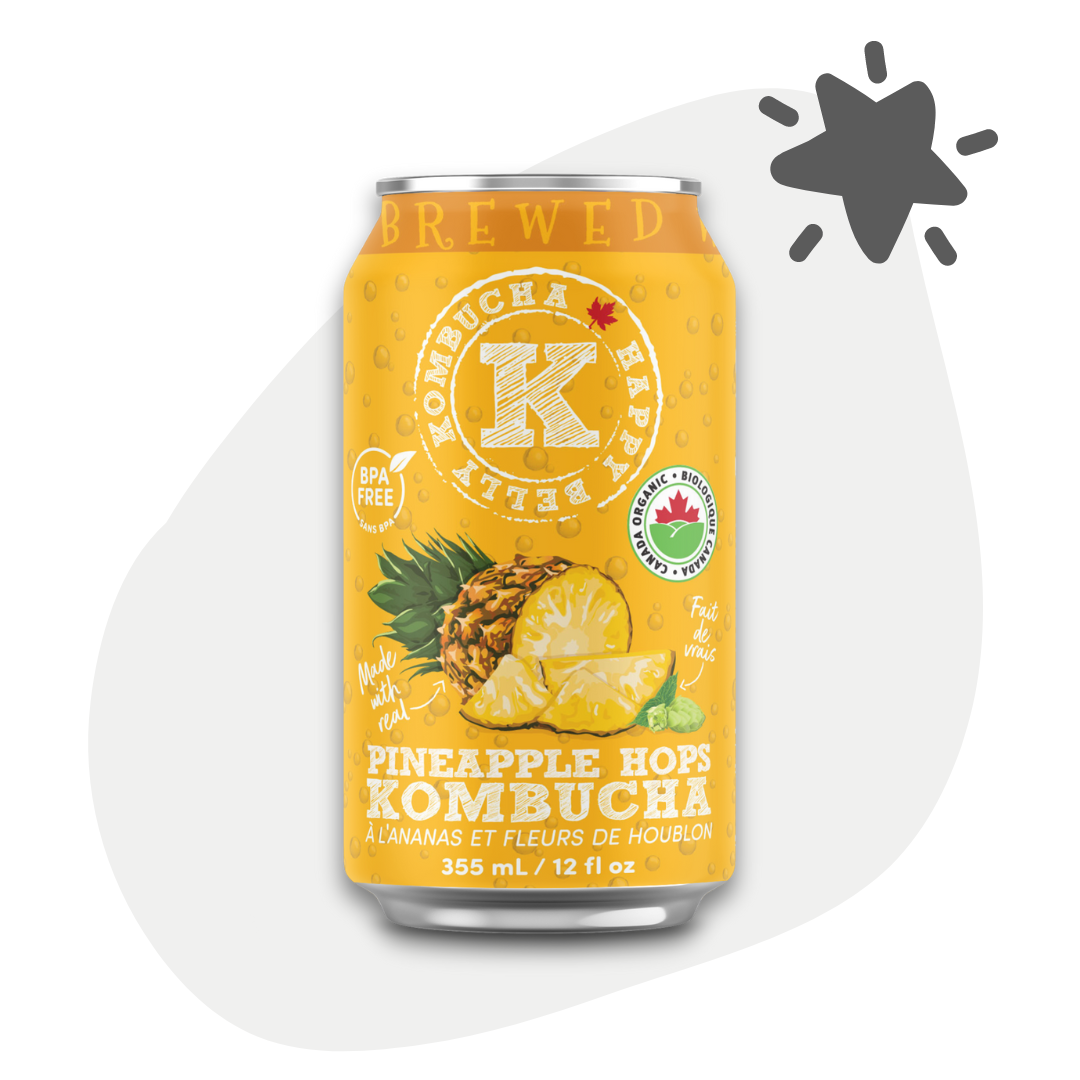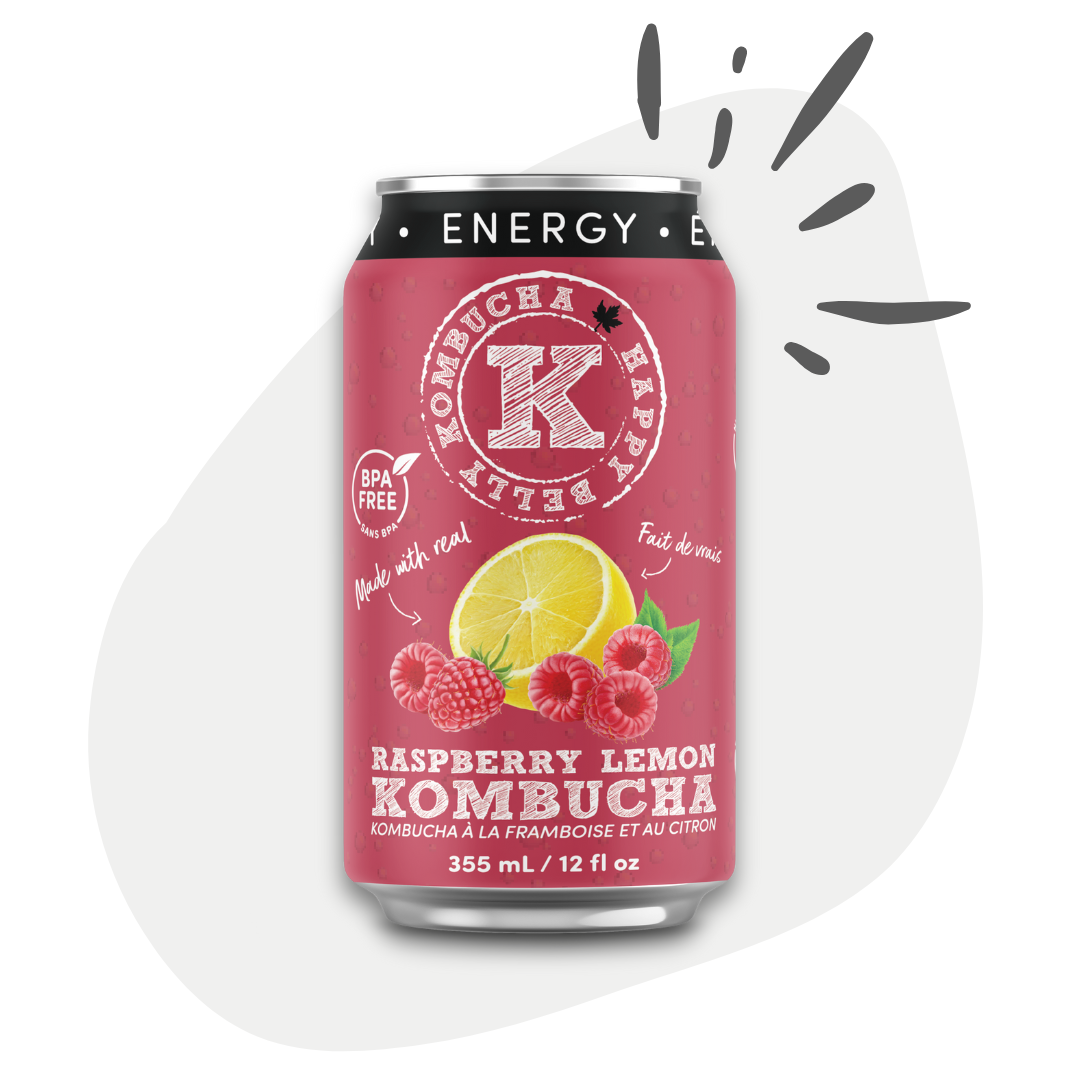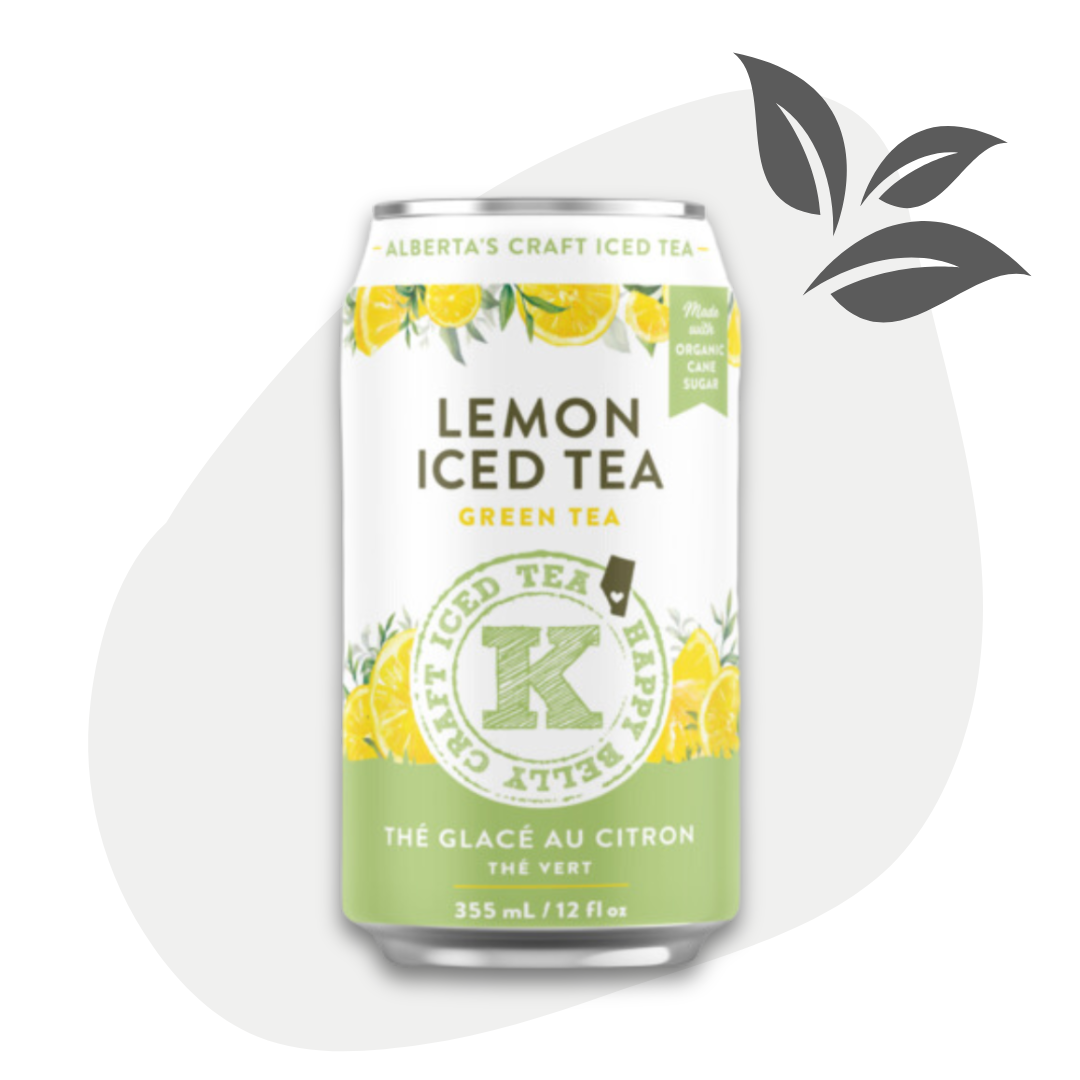
About Kombucha

Kombucha is a traditional fermented drink typically brewed with black or green tea and sugar. It contains a variety of vitamins, minerals, probiotic bacteria, and enzymes, and has been prized by traditional cultures for its health-promoting properties.To dive in deeper, Kombucha is a sweetened tea that is fermented with a starter culture SCOBY (a symbiotic colony of bacteria and yeast) and mature kombucha liquid to become a nutrient-rich beverage. The fermentation process takes 5 days or more depending on temperature and other factors. Some brewers ferment it for much longer however, and have perfected their brewing skills so that many different flavour profiles can be pulled from the beverage.
The live kombucha microbes consume over 90% of the sugar and caffeine during the fermentation process, resulting in a finished product that is low-sugar and low-caffeine. This process is similar to what would happen in sourdough bread, milk kefir, water kefir, and other ferments.
Once a very obscure drink, Kombucha is now a popular beverage that is available for purchase online, at local grocery stores, health food stores, and other retailers! Many people also brew their very own batches at home using various superfood ingredients and methods. If you would like to try an at home brew, you can purchase one of our DIY Starter Culture online!
--- HISTORY ---
The history of Kombucha has been widely studied and documented in recent years and while this drink's history is extensive spanning centuries and the entire globe we will attempt to summarize it here. For a well written and extensive history of Kombucha we recommend the Big Book of Kombucha by Hannah Crum & Alex LaGory.
The widely accepted origin story of kombucha dates back to 221 BCE during the Qin Dynasty, where Emperor Qin Shi Huangdi is said to have first made and consumed it to maintain his health and longevity. Known as "the remedy for longevity," "the elixir of life," and "the tea of immortality," kombucha was revered for its supposed life-extending properties. However, the discovery of tea itself is credited to Emperor Shen Nong around 2700 BCE. The author, a tea enthusiast, mentions their love for Anxi oolong and high-quality puer, which can enhance the flavor of pu'erh kombucha.
In the 20th century, kombucha gained popularity in Western Europe. During WWI, German physician Rudolf Sklenar observed its use in Russia for treating soldiers' wounds and later used it as a cancer treatment. Its popularity declined during WWII due to rationing but resurged in the mid-century across Europe. A notable story, though unverified, suggests Italians used holy water to brew more potent kombucha, angering priests who then preached against it, leading to kombucha's decline in mid-century Italy.
Interest in kombucha resurged in the U.S. during the 1980s, partly due to the 1986 Chernobyl disaster, where kombucha drinkers reportedly experienced fewer radiation effects. Studies confirmed its radioprotective effects again after the 2011 Fukushima incident. As a result, many undergoing chemotherapy drink kombucha, though medical advice is necessary. During the 80s and 90s, some HIV patients also used kombucha, but the CDC warned against it after a case of severe metabolic acidosis led to one death and another survival.
--- THE SCOBY ---

The SCOBY, or Symbiotic Colony of Bacteria and Yeast, is the collection of microbes responsible for turning sweet tea into a probiotic and enzyme-rich beverage. Essentially, it is a living colony of beneficial organisms that metabolize the sugars and caffeine in sweet tea to produce healthful acids, enzymes,
Sometimes we hear others refer to a Kombucha SCOBY as “The Mother” or “Mushroom”. A SCOBY is called “The Mother” because it is used to inoculate the next batch of sweet tea to turn it into kombucha. The reason some call a SCOBY a “Mushroom” is purely because a SCOBY can sometimes resemble a mushroom top. This is also the reason why Kombucha is sometimes called “Mushroom Tea.” and probiotics.
Not to worry, there is no fungi in a Kombucha SCOBY or kombucha at all! On a practical level, a SCOBY is a cellulose structure created by the kombucha microbes to seal off its food source (sweet tea) from additional microbes in the air.
Under proper care and proper brewing practice, a SCOBY can last for many years. In fact, there are families that have SCOBYs that are generations old, and have made many, many batches of kombucha over the years.
Once a very obscure drink, Kombucha is now a popular beverage that is available in your local grocery store, health food stores, and other retailers! Many people also brew their very own batches at home using various superfood ingredients and methods. If you would like to try an at home brew, you can purchase one of our DIY Starter Culture at our Taproom!
WHAT DOES KOMBUCHA TASTE LIKE?
This fermented tea has a slightly sweet and slightly tangy flavour profile, reminiscent of a shrub or vinegar-based drink. The flavour varies widely depending on ingredients and brewing practice.
KOMBUCHA NUTRITION
-
PROBIOTICS
Kombucha is a fantastic source of probiotics. Maintaining a healthy mycobiome has been shown to decrease disease, improve mood and support digestion.
-
AMINO ACIDS
Amino acids are the building blocks of protein and a kombucha SCOBY contains all 9 of the essential amino acids. The acids found in fermented foods provide a range of health benefits from improved mood to reduced chloesterol.
-
VITAMINS AND ANTIOXIDANTS
Fermentation has been shown to increase B vitamin content. B vitamins support a range of functions in the the body, boosting energy, and improving gut health. Antioxidants prevent disease by combating oxidative stress, and the fermentation process increases them.
-
ENZYMES
Enzymes are protein molecules that act as catalysts for innumerable physical processes. Enzymes are present in kombucha because the SCOBY produces them during the fermentation process.
-
LOW CALORIE AND SUGAR
Kombucha is lower in calories and sugar than many other carbonated beverages, such as soft drinks. Kombucha typically contains about 50 calories per 12 ounces / 355 ml.
-
NO BAD STUFF
Kombucha is plant-based, fat-free, nut free, soy free, gluten free, and dairy free. You can nothing but good stuff with every delightful sip!
Source: The Big Book Of Kombucha
KOMBUCHA BENEFITS
-
GUT HEALTH
Kombucha can help nutrient absorption, improve digestion, reduce acid reflux, and support a healthy gut microbiome.
-
ENERGY
Kombucha helps us digest food and when digestion is easier the body has more energy to send elsewhere. And because it helps detox our liver it purifies our blood which frees up energy for our muscles and our our brain.
-
MOOD
When we're not so toxic in our blood our cells are much happier. Additionally, healthy gut flora has been shown to improve mood. When we have more energy, we feel better, when we feel better we are much happier.
-
WEIGHT MANAGMENT
Kombucha contains natural alpha-hydroxy acids, the synthetic version of which are used by both dieters and weight lifters alike to improve the effectiveness of their regimes. The low calories and low sugar in Kombucha make it a wonderful replacement for soft drinks which can impact weight management.
-
HEART HEALTH
Drinking kombucha regularly has been linked to lower LDL rates (bad cholesterol). this means there are fewer fatty deposits in the bloodstream which can cause artery blockage. Additionally, regular consumption of kombucha has been shown to improve HDL levels (good cholesterol).
-
IMMUNE SYSTEM
The high antioxidant levels in kombucha help clean up free radicals and the antimicrobial effects prevent infection from pathogenic organisms like listeria. Benzoic acid and itaconic acid found in kombucha also play a role in boosting the immune system.
Source: The Big Book Of Kombucha
KOMBUCHA AND PREGNANCY
Is kombucha safe to drink during pregnancy and breast feeding? Here is a very well written article on this topic. [Click here to read more…]
* Statements above have not been evaluated by the Food and Drug Administration. Happy Belly Kombucha recognizes that every body is different. Although there are many claims in regards to kombucha’s health benefits, the Happy Belly Kombucha Team highly recommends that one seeks advice from a health care professional when it comes to treating, curing, or preventing any disease.
-

CLASSIC KOMBUCHA
Welcome to the world of Happy Belly Kombucha, where refreshments and well-being...
-

ENERGY KOMBUCHA
This is a groundbreaking innovation that fuses the healthful benefits of kombucha...
-

CRAFT ICED TEA
This line of Craft Iced Tea is designed with the health conscious...
-

SUBSCRIPTION
Health-full + Helpful = A Happy Belly Subscription. Born for one mom's...





